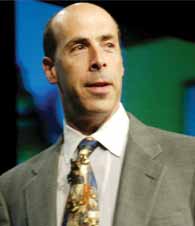|
Executive Interviews: Interview with Rob Jolles on Executive Development
October 2007
-
By Dr. Nagendra V Chowdary
 Rob Jolles
Rob Jolles President of Jolles Associates Inc., speaker and author 
Many executive development
programs are structured to enhance
very broadly, the knowledge, skills
and attitudes. But we rarely come
across execut ive education
programs centered on inculcating
in executives a sense of
belonging the legacy they are
treading and should leave, etc. It's
primarily the software vs.
hardware. The software does not
seem to attract so much attention.
Why is it that companies do not
take their executives through a
"history vision values" journey?
I'm not sure why, but I certainly
agree they should. The history of
Xerox, for instance, was taught in a
program in the first two weeks of
employment. It was not an option.
|
|
That program helped teach culture.
At Xerox, this led to make all
employed not feel like employees,
but family members.
How to make development a
fundamental part of organizational
design?
Simple. Development is not an
option. It's a condition of
employment. What do you think is the role of
Business Schools in providing not
only the required talent but also in
equipping the managers and senior
managers in ever increasing demands
of knowledge, skills and attitude?
That depends on the school. For
instance, if you toldme the Wharton
School of Business had a training
program for a company I was
working with, I would sign up my team. However, many Business
Schools are a little out of touch with
real world scenarios. They are
theory driven, but not reality based. It has always been a case of elite
business schools (Ivey league business
schools) leading all way in this space?
Why do you think it's so much more
difficult to break this barrier for other
non elite business schools?
First, having worked with a
prominent Ivey League school, I
would not be so quick to assume
that these schools lead the way. My
programs are taught in over a dozen
universities. I would personally
endorse two of them. One of them is
the University of Houston. They
may not be considered "elite" but I
would. They have wonderful
curriculum, great teachers, and a
dedicated student body. Good
instructors and good curriculum
will break the barrier. In the light of increased
globalization and greater role of
emerging economies' companies,
what specific trends do you foresee
in executive development
programs?
I work with a major European
training organization. They have
been sending trainers here to the
States to observe my sessions. It is
amazing to me, no matter what the
language, we all share the same
issues. So, I suppose this increased
globalization has leveled the
playing field, and created a more
homogeneous environment.
|
The Interview was conducted by Dr. Nagendra V Chowdary, Consulting Editor, Effective
Executive and Dean, IBSCDC, Hyderabad. This Interview was originally published in Effective Executive, IUP, October 2007. Copyright © October 2007, IBSCDC
No part of this publication may be copied, reproduced or distributed, stored in a retrieval
system, used in a spreadsheet, or transmitted in any form or medium electronic,
mechanical, photocopying, recording, or otherwise without the permission of IBSCDC. 1.
Training and Development Case Studies
2. ICMR
Case Collection
3.
Case Study Volumes
|
